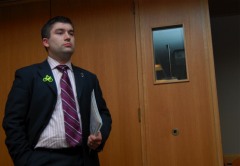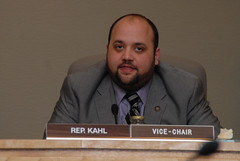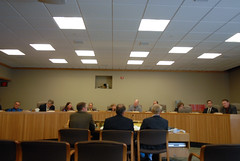[Note: This story was reported live. For results of the hearing, scroll to the end.]

introduced the Idaho Stop bill to his
colleagues on the House Transportation
Committee.
(Photos © J. Maus)
I’m sitting in Hearing Room D inside the Capitol at a hearing by the House Transportation Committee for the BTA’s Idaho Stop law.
In the room are the BTA’s chief lobbyist Karl Rohde, lawyers Ray Thomas and Bob Mionske, members of the BTA’s legislative committee Doug Parrow and Bjorn Warloe and even former BTA executive director Evan Manvel has stopped by (he now works on legislative policy for the Oregon League of Conservation Voters).
Representative Bailey (SE Portland) has just introduced the bill. Bailey is the bill’s chief supporter and he opened his testimony with a copy of the recent Oregon Business magazine that touts the state’s “Bicycle Industrial Complex.”
“The only thing more annoying than getting caught behind a bicyclist on the road is getting caught behind a bicyclist who’s obeying every single law.”
— Rep. Nick Kahl, in support of the bill
“This is about the economy, people’s health, and about the environment.” Bailey is making the case that this bill will make bicycling easier, safer and more attractive because, for one, it would make using residential streets more appealing (versus riding on fast streets/arterials). “We’re not legalizing bad behavior,” said Bailey, we’re decriminalizing good behavior”.
Rep. Nick Kahl (D-Portland) was first speak up from the Committee. He said he wasn’t supportive of this bill until this weekend. Kahl said he came around for two reasons. First, he had a conversation with his brother-in-law who told him: “The only thing more annoying than getting caught behind a bicyclist on the road is getting caught behind a bicyclist who’s obeying every single law.” (Room erupts in laughter). The other thing Kahl said won him over is that he just bought a new bike. While on a test ride near the Bike ‘N Hike on SE Grand in Portland he said, “I realized how many times I didn’t come to a full stop.” “I’m fully in support of this bill,” he said.
Rep. Jim Weidner (R-Yamhill) spoke up next and said, “I have some serious concerns about this bill.”
“I teach my kids that they need to make sure no cars are coming when they approach an intersection,” he began, “and making it legal for them to blow through stop signs isn’t a good precedent for us to be setting.”
Weidner went on to say that when he comes up to a 4-way stop he doesn’t like to, but he stops because “it’s the law”. After making a comment that this bill would allow people to “blow through” stop signs, he also said he’s concerned about the precedent this sets for kids. “I’m a little nervious,” he said, “the last thing I want to do is vote on legislation that could result in a situation where a child could die. This is a very serious bill we’re dealing with here.”
“I think we’re creating a bad situation by having two sets of rules.”
— Rep. Weidner
Rep. Bailey countered Weidner’s concerns by clarifying that the bill won’t let anyone “blow through”. (Actually, the bill includes a provision that would make the citation fee 50% higher than it is now.)
Karl Rohde of the BTA then began his testimony by saying that his organization has taught over 50,000 kids throughout Oregon on how to bike safely. “We firmly believe this law is in the best interest of all road users. The BTA is deeply committed to the safety of bicyclists and we would never support a bill that would jeopardize that safety.”
“The bad behavior will continue to be against the law,” Rohde said, “and we will continue to work with law enforcement officials to make sure that dangerous riding behavior is not tolerated.”
Rohde then continued to make his case for the law proposal. He stressed that bikes have a much greater sense of their vehicle, “no blind spots” and he referenced studies that have shown that the sensory awareness of a biker is akin to that of a pedestrian.
Rohde also introduced the conundrum of how many residential streets are full of stop signs nearly every block, yet those are precisely the streets that the city is encouraging people to ride on (instead of going on busy and big arterials). Having to make that decision is not a good position to put citizens into says Rohde.
Rep. Vicki Berger (R-Salem) shares her feelings that the law will just introduce more confusion into the system. “What about the bike lane here in Salem that has a stop sign in it? Will this apply to that?”, and, “I’m scared to death of the bike boxes”, she said. Berger thinks the bike boxes are confusing and says she’s concerned about “a whole new set of rules”.
Continuing in the vein, Rep. David Edwards (D-Hillsboro) also shared that he feels the bill “presents a level of uncertainty”. He then asked Rohde, “Would you also be in favor of allowing pedestrians to just come up to a street and go across without stopping?” Rohde replied that pedestrians are actually currently allowed to do that.

Mionske (L) and Ray Thomas (R) in
background.
Now Rep. Weidner chimes in. “It’s like we’re making two sets of rules,” he says, “I think we’re creating a bad situation by having two sets of rules.”
Rohde counters by pointing out that there are already several instances where there are two sets of rules — bikes can ride on the sidewalks and cars can’t and bikes can pass on the right at intersections and cars can’t.
“Can you define for me the difference between a bicyclist and an electric car?”
— Rep. Cliff Bentz, wondering why the bill doesn’t also include electric cars
Weidner then shares his concern over the bill’s “slow down” language. “How slow is slow enough?” he wonders. Rohde says that that definition can be worked on later. Rohde also adds the point that bikes present far less danger than cars. “Over 40,000 people die in cars each year, that’s why we regulate them more highly than bikes.”
Again, Weidner: “My concern isn’t small, rural towns, my concern is big cities like Salem and Portland.”
Then Rep. Cliff Bentz (R-Ontario) spoke up. He said that since it seems the reason for this bill is to encourage more people to ride bicycles, than why doesn’t Oregon enact a similar law for electric cars (which the state also promotes the use of).
Bentz asked Rohde: “Can you define for me the difference between a bicyclist and an electric car?”
Rep. Bailey than chimed in that this bill isn’t solely about promoting bike use, but that it’s also about improving conditions (safety and convenience) on the road. Also, he added, “Electric cars are part of a transportation system that was created to handle cars. They are not fundamentally different than gas-powered cars. A bike, to me, is a fundamentally different kind of transportation.”
Next up to testify was lawyer Ray Thomas. Thomas is on the BTA’s legislative committee who is an ardent supporter of the Idaho stop law. He has put countless hours into bringing it to Oregon.
“We’re all here for the same reason,” he began, “Laws are important and they should guide our citizens in a safe way. When we see a law that is being universally disregarded, we don’t like it.” People are violating the existing stop law, Thomas said, because “they seem to think it’s o.k. to violate it.”
Thomas’ testimony was lengthy. He touched on legal arguments, safety data (the cause of collisions is not running stop signs, it’s because someone makes the wrong decision on when to proceed through an intersection).
Thomas also pointed out that this law would free up police officers to focus “only on the most dangerous behavior”. He also pointed out that the new bill would make tickets to bikers that blow through stop signs unsafely go up 50%.
As for the concern for teaching children, I think Thomas had an interesting point. He said that,
“The reason we apply different rules for kids and teach them to stop regardless of if they have the right-of-way or not is because they don’t have the biological maturity and awareness or the judgment to cross safely yet… so we wait until they are old enough before we let them make those choices on their own.”
After Thomas, lawyer and author Bob Mionske testified. He basically concurred with what had already been said. After his testimony, Rep. Weidner wondered to him whether or not it would just make more sense to require bicycle operators to get a special license so the state can make sure they know all the rules of the road. Mionske did his best to avoid that discussion overtaking the hearing.
The first citizen who testified was Kris Warloe (coincidentally, the father of Bjorn Warloe, member of the BTA legislative committee and the guy who tried for Idaho stops last session). Mr. Warloe lost a leg in 1956 and is gave his support to the bill saying, “I’m going to continue to break the law, but I’m going to do so because it is far safer for me to do so. I encourage you to support this bill.”
“It’s time the laws of Oregon acknowledge the laws of physics.”
— Evan Manvel
Next up was former BTA executive director Evan Manvel. His argument in favor of the bill was that if biking is made easier and the state removes impediments to doing it (like stop signs), than more people will bike. As more people bike, the roads become safer. Therefore, the Idaho Stop Law would make Oregon a safer place to bike.
Manvel had a great one-liner to conclude his testimony: “It’s time the laws of Oregon acknowledge the laws of physics.”
After that, the good news on the bill seemed to run out.
Bob Russell from the Oregon Truckers Association — an organization that has been a productive partner with the BTA and who has supported many bike bills (including sharing costs for the Share the Road license plate) — said he has major concerns about this bill. Russell’s concerns were two-fold. He thinks it will confuse expectations of vehicle operators on the road if not everyone is obeying the same rules, and he says that the bill requires too much judgment on the part of the bicycle operator.
“The way this bill is written, it requires people to make significant judgment as to whether they can go through a stop sign or come to a stop. Some will make that judgment just fine, others will not. I worry a lot about children being required to make these kinds of complex judgments.”
Based on that, Russell said, “This bill is of significant concern to my industry in terms of safety.”
Since Russell introduced himself as the only one in the room who was opposed to the bill, Rep. Weidner shared that he received a letter from the City of Eugene saying they are also not supportive of this bill.
Next up was Matt Jaffe from the City of Portland’s Office of Government Relations. Jaffe stated that Portland is taking a neutral position on the bill. I spoke with Jaffe after the hearing and asked him what exactly is giving them pause. Saying the law would represent a major paradigm shift in how the city approaches traffic law, he added that their neutral position is a mix of balancing safety and enforcement concerns with a strong desire to promote cycling.
Back to the hearing. Brock Howell from the 30,000 member strong non-profit Environment Oregon put their support behind the bill saying it is a “key component to ensuring we create better communities for our future.”
Then came what I think the BTA will see as the biggest surprise of the day. A representative with the League of Oregon Cities (didn’t catch his name) expressed his opposition to the bill. The man — who introduced himself as a biker who “appreciates the frustration of coming to a stop,” but also as one who “recognizes that stop signs are placed for a reason” — said their chief interest is in “protecting the safety of the public”.
He also referenced Newton’s Law to point out the potential for dangerous situation if this bill passes. “Objects in motion tend to stay in motion,” he said, and then went on to describe a situation where someone on a bike might enter an intersection without stopping only to realize they made a bad choice, but then it would be too late to stop.
In her closing remarks on the hearing, Rep. Terry Beyer said she is most concerned with the confusing messages this bill sends to the public and how, if not handled properly, that messaging could become a PR nightmare. “The public is going to see this as, ‘there the bicyclists go again, asking for special treatment’,” said Beyer. She then added that “I understand the arguments in favor of it, but I also have to think about the messaging.”
Chair Beyer did not ask the committee for a vote today, nor did she schedule a work session. At this point, Karl Rohde from the BTA must work to get Beyer to schedule a work session and an eventual vote, or the bill will not go any further.
After today I feel like the fate of this bill is unknown, but it definitely took some lumps. Thinking back at the hearing, Karl Rohde from the BTA was very impressive. He had all the best answers and stay composed even in the line of fire. If you support this bill, you want him doing all the talking.
As for the bill’s chances. If there continues to be confusion and misconceptions about it in the media and in the public (the two are directly related), and if the result of that confusion is continued divisiveness between road user groups, and if legislators fail to hear a unified and/or clear message from constituents, then I think it’s in trouble.
That being said, it all comes down to votes. There are 10 members of the committee and the BTA only needs 6 of them to support the bill for it to move on. Right now the BTA has two “yes” votes in the bag (Bailey and Kahl) while only one committee member seems outright opposed to idea (Weidner). Bentz, Edwards, Berger and Boone have expressed concerns and have questions but they still seem on the fence.
Rep. Gilman (R-Medford), didn’t speak at all at the hearing and sources say he might not be supportive. That leaves Chair Beyer and Rep. Michael Schaufler (D-Happy Valley). Schaufler — a co-sponsor of the bike registration bill, but someone who Rohde says is a bike supporter — did not express concerns about the bill today (nor did he express support). Chair Beyer seems to have learned a lot today and now understands the idea more clearly. If Rohde can sit down with her and turn her into a proponent, it seems very likely he’ll be able to must the majority he needs.
But there’s still work to do for supporters of this bill… and you never know what kind of reaction the local media’s coverage will stir up. We’ll see. I’ll keep you posted.
— Browse our Idaho Stop Law tag for more coverage of this issue.




